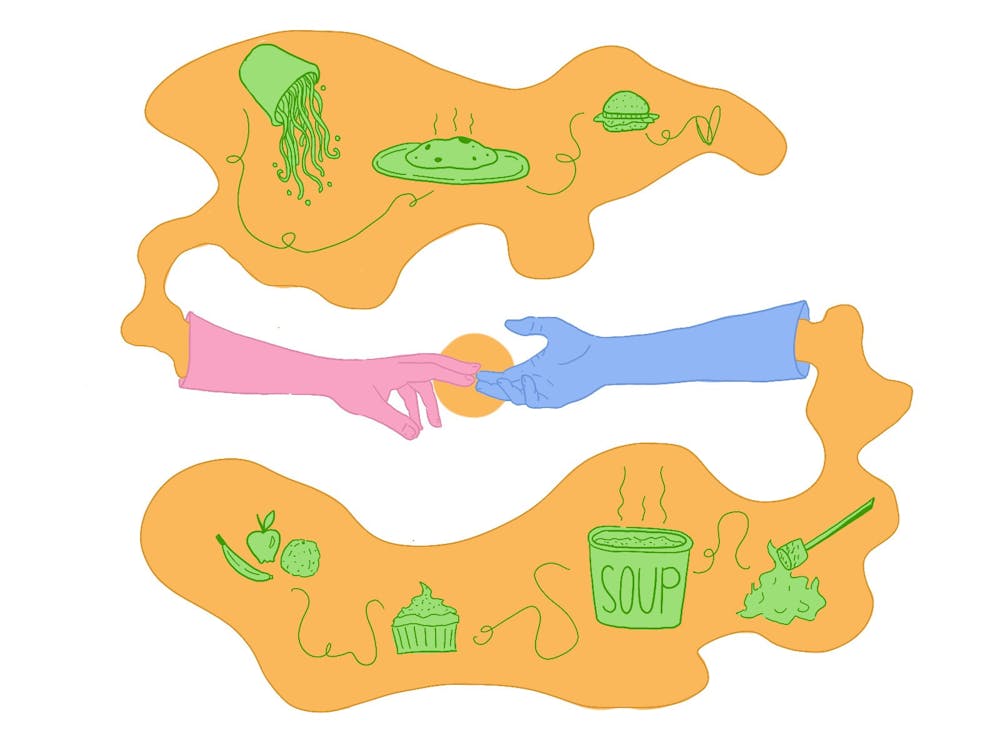Chocolate-chip banana muffins. Picture them. Soft and robust, their tops golden and cracked like a drought-split plain. I’m standing in front of two full plates, one batch with peanut butter smeared over top, another without. I’ve just come downstairs to the living room and here they are, on the foot-tall dining room table that Ben and Coco built from scratch in the Brown Design Workshop. "Where are these from?" I ask the room.
Ava answers: "I made them! Have some!"
You can imagine, at 5:45 p.m. on a Wednesday (in other words, hump day, slump hour)–when lunch had been an Engineering Café sandwich devoured on a slightly wet bench near the SciLi hours before (and I had forgotten napkins)—how it felt to bite into one of those homemade muffins, the sweet crumbs sparking and prickling on the tip of my coffee-burnt tongue.
Thinking: This is how we care for each other. This is how we make a place home.
This scene was made, if not possible, than at least more probable by my living in North House. North and West Houses, both located on Brown’s campus near Pembroke Quad, make up the Environmental Program House (EPH). EPH members, including sophomores, are generally not on the Brown meal plan; instead, they pay much lower dues to the house, order food in bulk, and cook in their kitchens. Six days a week, a rotating slate of residents make dinner for everyone (around twenty people, or sometimes more on open dinner nights). I’ve only been part of North House for a few weeks so far, but I’ve already fallen in love with this way of living.
The sugary, reviving scent of onions frying, the steadying aroma of cumin: Nothing says home to me quite like the sensory recalibration that comes from stepping into a room where something’s on the stove. It doesn’t matter what, really; it’s just the fact of it: a promise of comfort, a reaffirmation of routine, and a sense of being cared for in the most essential of ways—through sustenance. Cooking and love are inextricably linked in our cultural imagination, in a sense perhaps best summed up by a Pillsbury Doughboys ad slogan from 1962: “Nothin’ says lovin’ like something from the oven!” But commercial clichés and their invariably bad gender politics aside, there’s something to that, because is there any more fundamental way of supporting and caring for a person than by making the stuff that keeps them alive?
Of course, feeding someone takes work, whether it’s the work of the Brown dining staff or of our own hands. The EPH system ensures that this work is evenly distributed between members using a biweekly jobs quota, rejecting any gendered (or class-based) allocation of unilateral domestic labor. EPH’s program is mutual and reciprocal, and much of my appreciation for the meals I eat here comes from knowing all too well the labor that goes into cooking for twenty. My first week at North House, my shift partner and I set out to make falafel. Sixty minutes into the two hours we were allotted, we were still struggling to puree the chickpeas using a two-cup, roughly 1994-model push-down blender which made horrifying shrieking sounds and only managed to cut the chickpeas in half at best. Our ears were ringing, we were tired, we still had registration overrides to fight for, and we just wanted to be done. But the comical frustration of the process was superseded by the delight of completion—placing the pan of charred and almost-collapsed patties on a folded towel atop the table from the BDW, and hearing my housemates admire, exclaim, and devour what turned out to be a fairly delicious meal.
Living communally in EPH isn’t just about cooking; it’s also about intentionality in our use of a shared space, building a culture of care, and generally figuring out how to coexist as young adults under near-perpetual stress. These are vital skills and, speaking personally, not particularly easy ones to learn.
Now, it is possible to learn how to do these things in a typical dorm setting. But EPH, much more so than first- and second-year dorms, mirrors the kind of conditions that students will experience living off-campus as upperclassmen or graduates. In real life there is no meal plan; roommates often budget, shop, cook, and eat together. Space is shared to a much greater extent than in dorms, which are essentially hallways with double- or single-bed bubbles jutting off and an underused gesture at a living room in the form of the floor lounge. In real life, there’s a much greater imperative to set boundaries about the use of common spaces, often among a larger number of people—and, maybe most importantly, to fairly allocate the labor that goes into keeping a home up and running.
And while upperclassmen and graduates often have the privilege of living with friends and loved ones, many young adults end up with roommates they choose by necessity rather than preference. North House mirrors real life in this way too: Some members, including me, applied and moved in with a close friend or two, but generally we’re living with people we did not directly choose and might barely know. Still, we cook for each other. EPH challenges the idea that people are only obligated to care for the people we know and love and have already chosen. Love and community can grow out of care—care as a choice, a habit, a blind act of faith—and not just the other way around.
Learning to care for each other means paying attention to the little things—the things that might otherwise pass us by. It takes practice. You realize that you might not care about wearing street shoes indoors, but the sight of a damp Doc Marten past the living room threshold has the power to derail your housemate’s day. You realize that playing guitar in the living room in the evenings can make everyone a little happier, but you also notice when one of the residents of the first-floor bedroom starts to look weary, and you pack it up for the night. You are not good at noticing these things at first. But you get better.
EPH’s setup lets members learn how to live together as adults while still enjoying many of the supports that come with living on campus. Facilities still clean our bathrooms, and we can still call them if our toilet breaks or the heat won’t turn on. ResLife is still available to deal with lost keys and roommate conflicts and whatever else might turn up. This system recognizes the value of learning and practicing communal living skills as a way of showing care for each other in community, while recognizing the potential pitfalls in that process and is structured to allow for guided growth. But in this, EPH is the Brown exception, not the norm.
The way that Brown chooses to structure the experience of a typical (non-EPH) student reflects on the values of this institution. By having first- and second-year students live in dorms and eat in dining halls, the school sends the message that the only labor we’re responsible for is intellectual labor—and that the work of shopping, cooking, and cleaning are secondary. While the university seeks to “[prepare] students to discharge the offices of life with usefulness and reputation,” it doesn’t view the work of home and community as part of this. Domestic labor is something you can tack on during senior year, off campus—but it is not integrated into Brown’s educational plan or pedagogy.
This should come as no surprise. Institutions of higher education, especially elite ones like Brown, almost definitionally privilege the intellectual over the domestic. Part of this probably stems from the histories of these schools: Brown was an all-male institution until 1971, and, although its financial aid offerings have expanded in recent years, it remains the richest Ivy by average family income. The dorm and meal plan format (while space constraints and financial incentives would surely have contributed to its implementation) may stem from Brown’s initial audience and some legitimate assumptions made about their needs: A wealthy male student in the early twentieth century would probably never need to learn to cook for himself. He could rely on paid help, or a wife, to attend to him. Today many things are very different, but the Ratty and all its younger cousins still hold campus in their grip.
Except—not quite. We still have Ava’s chocolate chip banana muffins.
And you remember how I said those were made not possible but just more probable by EPH? There is cooking all around us, actually, despite the perpetual griminess of Keeney kitchens, despite our tiny minifridges and the fact that the closest real grocery store is a twenty-minute walk away. There are nights out that end with Israeli malawach fried up on the Perkins stove. There are birthday parties where someone brings a loaf of bread, and someone still has potatoes and cauliflower from their summer farm share, and it all gets dressed in just-mixed tahini (easy to bring from home if you buy it as a powder). And then a few of us go out to Jo’s, in the pouring rain, for mozzarella sticks and the good fries to complete our feast. There was that one time when some friends were so committed to baking a birthday cake—past 10, when all the stores were closed—that they DoorDash’ed a single carton of eggs. The eggs showed up hours later, because, as it turned out, the guys on the third floor had mistaken the delivery-man for their weed dealer and sent him off with two hundred dollars in cash. But the eggs got to my friends eventually, and the cake was made, shared, and sung over. And maybe that’s the better skill to learn: how to make a cake in a greasy half-kitchen when the stoners have got the eggs. Or, in other words: how to care for each other, despite everything.
Lily Seltz is a former staff writer for post- magazine and new writer for the The Herald. She studies English (Nonfiction) with a certificate in Migration Studies. She is always searching for a better bagel.




